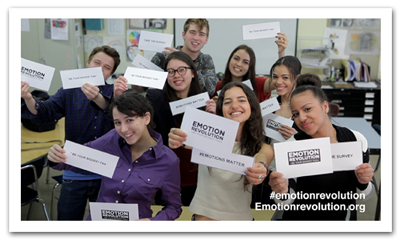
“What the best and wisest parent wants for his child, that must we want for all the children of the community.”
– John Dewey
The Emotion Revolution
Yale Center for Emotional Intelligence
Emotion Revolution, a joint initiative between the Yale Center for Emotional Intelligence and Born This Way Foundation to build awareness around the critical role of emotions in learning, decision-making, and both student and educator wellness and effectiveness. The goal is to drive the national conversation that charges schools with increasing their focus on building positive school climates and integrating social and emotional learning (SEL) to improve young people’s prospects for leading happy, healthy, and productive lives.
Before we can start the conversation, we need to listen. That’s why an anonymous online survey was launched that will ask high school students from around the country to take ten minutes and share how they currently feel in school, how they want to feel, and what they believe needs to happen to bridge the gap between the two. The survey was reviewed and approved by Yale University’s Human Subjects Committee.
Results from the survey will form the foundation of the Emotion Revolution Summit. Hosted at Yale this fall, the summit will feature youth participants, Yale President Peter Salovey, and Lady Gaga. The summit will serve as a platform to both unveil the findings and offer youth the opportunity to share their ideas for creating improved learning environments with key educators, academics, and policy makers. Also, with support from Facebook and key partners, they will begin to provide youth and educators with the resources they need to accelerate positive changes in their schools.
The need for an Emotion Revolution has never been greater. Far too many young people today are feeling overwhelmed, isolated, and bored. For the first time, high school-age youth are feeling more stressed than adults. Left unchecked, such emotions can impair mental and physical health, interfere with learning, and hinder prospects for future success. The Emotion Revolution is dedicated to helping to reverse these trends.
Parents, Teachers, School Administrators Know Best
Editorial: New York leaders misread opt-out message
The Journal News
Let reason prevail. The April 17, 2015 Journal News editorial, “New York leaders misread opt-out message,” presents a good regional and national perspective on Common Core, testing and teacher evaluation. NYSED, Board of Regents, Arne Duncan, President Obama, school boards, presidential candidates, legislators and Governors should:
- Value and trust parents, teachers and administrators.
- Look at the opt-out data (from 20 – 40% in many of the Lower Hudson Region of New York according to the Journal News article); it is significant and a game changer. If state and Washington education departments, governors and legislators are making decisions based on data, than they should realize the significance of the high numbers of parents who object to the weight given to standardized testing and its negative impact on their children and teachers. We are told that we must make critical decisions about deploying precious fiscal and human resources based on data. The story the data tells is clear.
- Change course now.
It will not benefit any let alone all students to pursue a failed reform movement. Current research points to the importance of recruiting, retaining and training, highly qualified teachers and administrators as well as aligning certification programs and professional development to the real world skills educators need to ensure that their students will be college and career ready. This pedagogy for the 21st century involves educating the whole child; it involves understanding the challenges of technology and the emotional complexity of growing up in today’s uncertain and rapidly changing world. This does not mean spending precious days, weeks and dollars on test prep. Moreover, controversy abounds not only about the validity and reliability of the tests, but also about the curriculum on which these tests are based. Is it a curriculum for today and tomorrow or for yesterday?
- Collect data on what educators think is best in Common Core and what else constitutes curriculum.
- Improve teacher and administrative certification programs to better align with 21st century research on how kids learn.
- Co-create with all players a teacher evaluation system that creates a true 360 model.
And stop wasting time and creating a highly stressed generation of children aged 9 – 14 who hate school.
Grading Teachers by the Test
New York Times
Eduardo Porter, ECONOMIC SCENE, March 24, 2015
The Business Section of The New York Times, specifically in space given to stories about the economy, is reporting on what various states are doing and what several studies conclude about the value of using student test data to evaluate teacher performance. As parents increasingly “opt-out” their children from taking these tests and as concerns increase from parents and educators about how test makers are monitoring students’ social media sites, the advantages and problems of tying these scores to teacher evaluation is a hotly debated topic in the larger political and economic arena. Schooling is a multi-billion dollar industry and everyone wants a piece of the action. Applying a corporate bottom line to teaching and learning is a bad idea. As Iditarod winner Susan Butcher proclaimed, teaching her dogs to be winners, to persevere, to work as a team, to learn and be winners started at birth and depended on how they were treated and trained and cared for each and every day over years. One has to take a very long view to produce a champion she proclaimed. Ask any pro athlete and she’ll tell you the same thing.
“Some things they do will be good, in line with the objectives. Others will amount to cheating or gaming the system.” – Jonah Rockoff, Columbia University
“A performance metric is only useful as a performance metric as long as it isn’t used as a performance metric.” – Luis Garicarno, London School of Economics
Issues abound: how kids and teachers are “sorted;” who takes the test, gets extra resources and who doesn’t and who decides; drill and kill or teaching to the test; the value-added of the tests; how valid and how reliable are these tests anyway; factors outside of the teacher such as children living in poverty, resources of the school district and more. Many teachers do not want to teach either Special Education students or top students for the same reason: hard to get scores up at both ends of the student spectrum.
Ultimately this testing madness is not serving the important purposes which would make tests worthwhile: giving teachers information about students that will further the teacher’s ability to pinpoint the areas where a student needs extra support; where a curriculum needs improving; or where the teacher needs to improve in either content knowledge, pedagogy or both.
Professor Rockoff goes on to say, “. . . do not put too much weight on any single measure.”
I don’t think we need in depth university research and studies to come to the conclusion that any one moment in time, any one test, any one event can tell us all we need to know about the many factors that make up excellent pedagogy that results in student learning. Let reason prevail and redirect the high high costs of test making, test administration, and scoring analysis, into improving teacher training, teacher quality and increasing resources directly to the primacy of what goes on in a classroom each and every day.
A parent was outraged by his school telling parents that test results would not be back for one year. “What a waste is that?” Indeed.
Parenting in the 21st Century
I was talking to a neighbor today whose son just graduated college and who has two other children, one in high school and one in middle school. She remarked how much has changed just in the few years between her oldest and youngest children in terms of the stress on her kids; the negative influences of social media, Facebook, Instagram, Youtube; the pressures of relentless testing and academic competition; the proliferation of prescription drugs – even heroin; the exposure to explicit sex and violence on TV, film, everywhere.
We both voiced our shock at the Miley Cyrus “twerking” performances (she has 49,893,051 followers on Facebook!) and wondered about what is the best way for a parent to guide their children through a time so different from their own adolescent experiences. Where are you Hannah Montana when we need you?
Counselors, psychologists, educators, researchers in the field of adolescent behavior are paying attention to how young people can develop what is called social and emotional intelligence. It is more important to the well-being and success of our children than their IQ and there is more they and we can do to build that skill. Developing healthy social skills is more a question of nurture and less one of nature than changing physical or intellectual characteristics.
At Jane Sandbank Group we are working with school districts, parents and students to advance social emotional skills. How can we help our children, for example (and ourselves) handle anger, anxiety or a sense of isolation? How can these skills improve academic performance, reduce stress and ensure overall health and well-being?
Please contact us if you would like to learn more and have us set up experiences to meet your organization’s needs.
Are We Hurting or Helping Our Children as We Try to Protect Them?
“Childhood should be a time of freedom and play, not building a resume for college,” Dr. Peter Gray
“I just want to do things by myself,” Sam, age 10.
Read Jane Brody’s “Personal Health” column on the importance for children to have more unsupervised time and more of our trust to work through their problems and build self-reliance.
Advice from America’s Worst Mom
Become a subscriber to JSG and feel free to post your comments.
Links of Interest
Stay Safe Online
Powered by National Cyber Security Alliance
Learn how to protect your family’s privacy online and discuss sensitive topics like sexting and GPS tracking with your children
Parenting Success Network
Online Parenting Resources
A Cure for Hyper-Parenting
NY Times Opinion Page
Children and Stress: Caring Strategies to Guide Children
Virginia Cooperative Extention
Common Core Math for Parents:
So many parents are asking questions about how to help their elementary children with their math homework given the changes in the way math is taught through the Common Core Standards. Teaching basic addition, subtraction, multiplication and division truly is different from the way we learned it and even the way mathematics has been taught in recent times. Here are a series of videos from EngageNY demonstrating the principles and concepts behind Common Core Math. We found them helpful. Let us know what you think.

